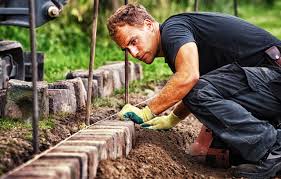Stories you may like
Landscaper
A landscaping worker maintains the grounds and gardens of residential, commercial, or public properties. This physically demanding role involves a variety of tasks, from routine lawn care to installing hardscapes like patios and walkways. Landscaping workers use a range of hand tools and heavy machinery to execute designs and keep outdoor spaces beautiful and healthy.
What is a Landscaper?
A Landscaper is a skilled professional responsible for maintaining the aesthetic appeal and health of outdoor spaces, primarily focusing on horticulture and ground care. This role involves a hands-on approach to cultivating and preserving lawns, gardens, and other planted areas. Landscapers ensure that properties look well-kept, healthy, and inviting, directly impacting curb appeal and property value.
This role differs from a 'Landscape Designer,' who focuses on planning and creating the blueprint for outdoor spaces, or a 'Landscape Architect,' who integrates environmental science and art to design large-scale projects. A Landscaper, by contrast, is the one who executes and maintains these designs, performing the regular, physical upkeep required to bring a vision to life and keep it thriving over time.
What does a Landscaper do?
Landscapers primarily work outdoors in diverse weather conditions, including sun, rain, and varying temperatures. Their work often involves physical exertion, such as bending, lifting, kneeling, and walking for extended periods. The work environment can be noisy due to equipment operation and may involve exposure to dust, pollen, and chemicals.
Most landscapers work as part of a small team, collaborating closely on projects and sharing responsibilities. Schedules can vary seasonally, with longer hours common during peak growing seasons and reduced hours in colder months. This role typically involves traveling between multiple client sites throughout the day, ranging from residential properties to commercial grounds. The pace of work is generally steady, with deadlines often tied to client expectations or seasonal demands.
Landscapers use a broad array of equipment to perform their duties efficiently. For lawn care, they operate walk-behind and riding mowers, string trimmers, and edgers. Pruning shears, loppers, and hedge trimmers are essential for plant maintenance. They also use shovels, rakes, wheelbarrows, and power blowers for general cleanup and material handling.
For more specialized tasks, landscapers might utilize sod cutters, tillers, chainsaws, and aeration machines. They also work with irrigation system components, pest control applicators, and various hand tools for planting and weeding. Safety gear, including gloves, eye protection, and ear protection, is consistently used to ensure a safe working environment.
Landscaper Skills & Qualifications
The qualification landscape for a Landscaper emphasizes practical experience and demonstrated competence over formal academic degrees. Employers highly value hands-on skills in horticulture, equipment operation, and site management. While formal education in landscaping or horticulture can provide a strong foundation, many successful landscapers begin their careers through vocational training, apprenticeships, or direct entry-level positions.
Requirements for landscapers vary significantly based on seniority, company size, and specialization. Entry-level roles often require basic knowledge of plant care, willingness to learn, and physical stamina. Senior landscapers or crew leaders need extensive experience, leadership abilities, and specialized knowledge in areas like irrigation systems, hardscaping, or pest management. Larger landscaping companies might prefer candidates with formal certifications or degrees for supervisory roles, whereas smaller, independent operations may prioritize a strong work ethic and proven field experience.
Certifications like those from the National Association of Landscape Professionals (NALP) or state-specific pesticide applicator licenses significantly enhance a landscaper's marketability and earning potential. These credentials demonstrate a commitment to professional standards and specialized expertise. The skill landscape is continuously evolving with new sustainable practices, drought-resistant plant varieties, and smart irrigation technologies becoming more prevalent. Landscapers must balance traditional horticultural knowledge with an openness to adopting these emerging techniques. Prioritizing practical application and continuous learning of new methods is crucial for long-term career success in this field.
Education Requirements
High School Diploma or GED; on-the-job training is common for entry-level roles.
Vocational training or certificate programs in horticulture, landscape design, or groundskeeping.
Associate's degree in Landscape Architecture, Horticulture, or a related agricultural science.
Apprenticeship programs with established landscaping companies, providing structured learning and practical experience.
Professional certifications such as Certified Landscape Professional (CLP) or state-specific pesticide applicator licenses where required for specialized tasks and chemical handling.
Technical Skills
Turf Management: Mowing, edging, aeration, fertilization, and pest control techniques for various grass types.
Plant Identification and Care: Knowledge of common trees, shrubs, flowers, and groundcovers, including their planting, pruning, watering, and disease management needs.
Irrigation System Installation and Repair: Understanding and practical skills in setting up, maintaining, and troubleshooting sprinkler and drip irrigation systems.
Hardscaping Techniques: Proficiency in constructing patios, walkways, retaining walls, and other non-living elements using materials like pavers, stone, and concrete.
Equipment Operation and Maintenance: Safe and efficient use of lawnmowers (walk-behind, ride-on), trimmers, blowers, chainsaws, tillers, and other landscaping machinery, including basic troubleshooting.
Soil Analysis and Amendment: Ability to assess soil conditions, understand nutrient requirements, and apply appropriate amendments to promote plant health.
Pesticide and Herbicide Application: Knowledge of safe handling, proper mixing, and targeted application of chemicals for weed and pest control, often requiring specific certifications.
Drainage Solutions: Understanding of water flow and the installation of French drains, catch basins, and grading techniques to prevent water accumulation.
Seasonal Clean-up and Winterization: Skills in leaf removal, gutter cleaning, garden bed preparation, and winterizing irrigation systems.
Basic Construction and Carpentry: Fundamental skills for building fences, decks, or pergolas as part of landscape design.
Soft Skills
Physical Stamina and Endurance: Landscaping involves demanding physical labor, including lifting heavy materials, bending, kneeling, and working outdoors in various weather conditions for extended periods. This skill is fundamental for consistent performance and avoiding injury.
Attention to Detail: Precision in pruning, planting, and maintaining aesthetic standards is crucial for client satisfaction and the overall quality of landscape projects. This ensures neatness and adherence to design specifications.
Problem-Solving: Landscapers often encounter unexpected challenges like difficult terrain, pest infestations, or equipment malfunctions. The ability to quickly assess situations and implement effective solutions is vital for project completion and client satisfaction.
Client Communication: Effectively listening to client needs, providing updates, explaining services, and addressing concerns fosters strong relationships and ensures project alignment with client expectations. Clear communication prevents misunderstandings.
Time Management: Efficiently organizing tasks, prioritizing work, and managing project timelines are essential for completing jobs on schedule and within budget, especially when juggling multiple client sites.
Adaptability: Weather conditions, client requests, and project scopes can change unexpectedly. A landscaper must adapt to new situations, adjust plans, and remain productive under varying circumstances.
Safety Consciousness: Consistently adhering to safety protocols when operating machinery, handling chemicals, and working on client properties protects oneself, colleagues, and the public. This minimizes risks and ensures compliance.
Team Collaboration: Working effectively with crew members, sharing tasks, and supporting colleagues are necessary for efficient project execution and a harmonious work environment. Many landscaping tasks require coordinated effort.










User's Comments
No comments there.